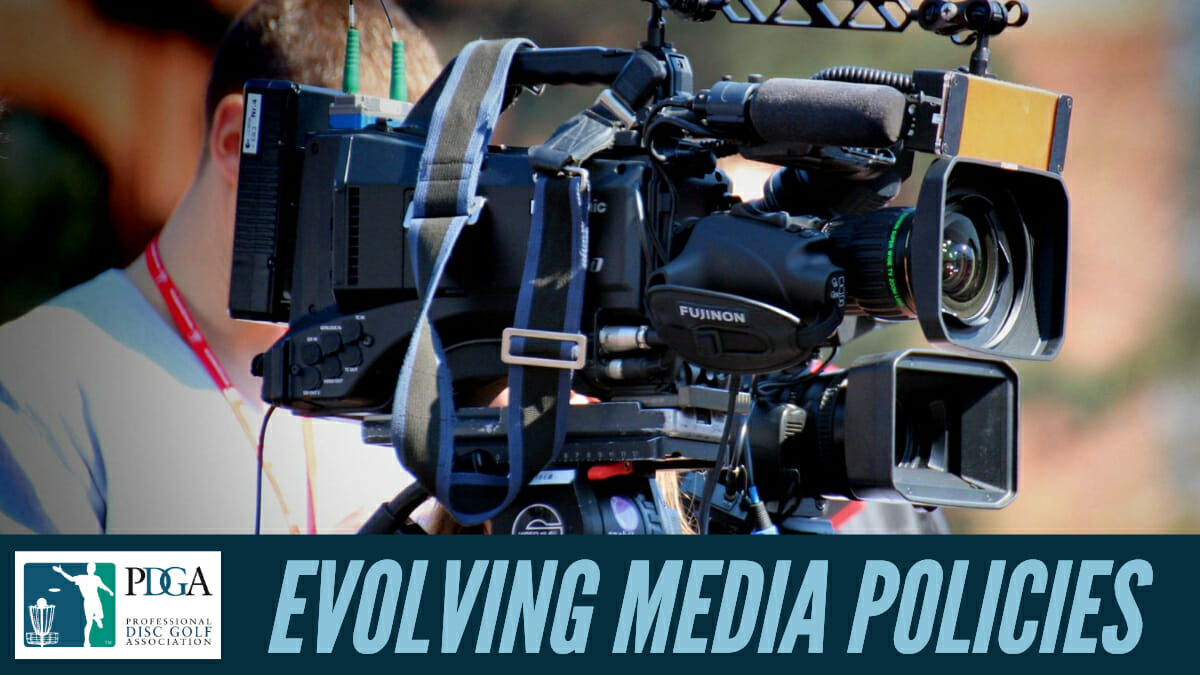Originally published at: https://discgolf.ultiworld.com/2019/02/21/pdga-nt-media-policy-gets-first-test-las-vegas-challenge/
A post on a popular disc golf discussion Facebook page brought up a topic that fans and tournament organizers have at times been reluctant to address, and it’s a conversation that will continue to occur as outside money and business interests enter the disc golf world.
Dixon Jowers was first to report on his On the Box with Dixon Jowers Facebook group that Dynamic Discs was informed by Las Vegas Challenge Tournament Director Jeff Jacquart that if the company wanted to film “non-round coverage” at the event the fee would be $5,000.
The cost was immediately debated, with many falling on the side of the quoted price being exorbitant. Jacquart was quick to state his side in the comments, which seemed to fall on deaf ears.
“I think the latest version of the PDGA media policy has a really good definition that addresses promotional product and commercial products,” Jacquart told Ultiworld Disc Golf. “Because their request was only to promote their players and their product it was considered commercial coverage.”
The 2019 PDGA National Tour Media Policy, which the LVC falls under, states: “Commercial media includes, but is not limited to: Videography and photography captured or distributed by a disc golf equipment manufacturer/retailer; Videography and photography that is captured by an independent contractor with the intent to be sold; Disc golf manufacturer/retailer social media accounts. Commercial media producers are required to request access from LOCs and may be subject to a fee or additional guidelines not outlined in this policy.”
PDGA Communications Manager Steve Hill further clarified to UWDG how it handles commercial media requests at NT events.
“We leave commercial media — that is, any businesses focusing on a single player or brand, an outlet that wants to film commercials, disc golf manufacturers’ social media channels, etc. — up to the Host team to manage,” Hill said. “We’ve done this because Host teams and their presenting sponsors make sizable financial contributions to the events, and necessarily have interests there that they would like to safeguard.”
Hill said that the PDGA reviewed the media request from Dynamic Discs and,”it fell into the commercial media bucket and approval and any financial conditions would be handled by the Host team.”
For the LVC, Innova is the presenting sponsor. Jacquart stated that Innova alone contributed more than $100,000 worth of sponsorship to the event, which includes two course sponsorships valued at more than $10,000 apiece, and helps pay to rent a private venue such as Wildhorse Golf Club. He said at last year’s event, several commercial videos were filmed and that he did not believe it’s fair to tournament organizers or sponsors when companies use the resources funded by others to profit.
“I shouldn’t expect to show up and just make a commercial with a player. That isn’t the norm anymore,” Jacquart said. “It may have been 10 years ago, even five years ago. But there’s so much involved with running any event now I think people need to change a perspective as to what is common courtesy and allowance at these events.”
He continued: “That’s the kind of standard that we’re starting because of how important it was for us to balance our current sponsors. That’s a key thing I think each TD needs to look at when you adopt a media policy. If their biggest sponsor is $1,000 bucks, of course, they’re not going to charge $5,000 for media rights. Each event is different.”
When talking about media coverage around the LVC, you can tell Jacquart is loyal, and not just to his sponsors. He is protective of the people that he recognizes make events tick and don’t often get their due credit.
“We tend to overlook how these events are being run and it’s time we start to shed a little light on that as well,” Jacquart said. “None of these events could run without volunteers and clubs willing to dedicate the time to do this. And if you make them mad or you treat them wrong, there’s a chance that good events can go away. I’m sure it’s happened in the past and I think people need to understand, or have a different perspective, that these events aren’t always about them.”
As more companies and media crews come into the scene, the new PDGA media policies will continue to be tested and administered in myriad ways. Maybe the only constant will be change.
“I’m the Guinea pig. I’m the beginning of the season and I get to deal with this stuff all the time. Everyone has their own situation and every event is unique,” Jacquart said. “Our sport is growing and changing dramatically and we’re either going to become a professional sport or we’re not.
“This is a professional event and there are learning curves, and the media policy is going to be one of those learning curves for everyone. Not everyone agrees with it.”

